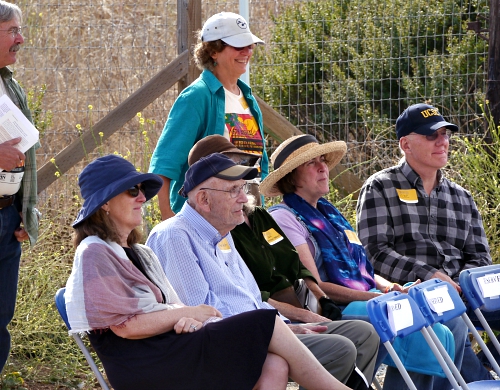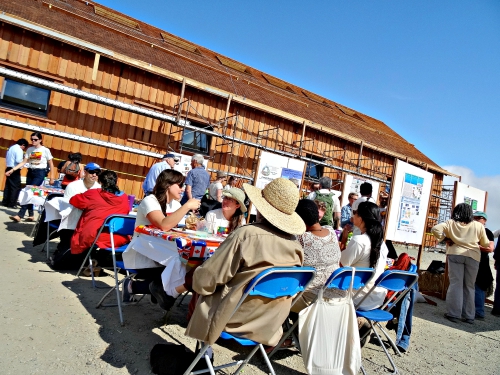Campus News
Gift to UC Santa Cruz funds new chair in water resources and food sustainability
UC Santa Cruz has received $500,000 from the Helen and Will Webster Foundation that with matching funds from UC Regents has established the Stephen R. Gliessman Presidential Chair in Water Resources and Food System Sustainability.



UC Santa Cruz has received $500,000 from the Helen and Will Webster Foundation that with matching funds from UC Regents has established the Stephen R. Gliessman Presidential Chair in Water Resources and Food System Sustainability.
The Gliessman chair, one of the most recently endowed chairs on campus, was announced Friday at a celebration of the first endowed chair, the Ruth and Alfred E. Heller Chair in Agroecology founded in 1982. Environmental studies professor Stephen R. Gliessman held it until his retirement five years ago. The past meets the present and looks toward the future.
“It’s quite an honor to receive this,” said Gliessman, who joined UCSC in 1981. “And I’m not dead yet.”
Alec Webster, (’02, College Eight, environmental studies), said his family helped fund the new chair to focus on water and sustainability issues and to honor Gliessman for his decades of promoting agroecology – the application of ecological principles to agricultural settings – particularly when it wasn’t popular.
International expert
“We wanted to honor Steve because he’s the international expert in the field,” said Webster, who arrived at UC Santa Cruz in 1987 to work at the Santa Cruz Institute of Particle Physics as a machinist and lab technician. Income from endowed chairs provides funding for faculty salaries and research support including graduate fellowships.
Webster and his wife Claudia (UC Santa Barbara, ’75, art) are major supporters of UC Santa Cruz and serve on the Social Sciences Dean’s Board of Councilors. Alec serves on the UC Santa Cruz Foundation Board of Trustees and also served on the South Campus Vision Council, which led to the Webster Foundation providing a gift for renovation and programming for the Cowell Ranch Hay Barn, which will be a hub of food sustainability activities on campus.
‘Agroecologia’
Gliessman and colleagues in southern Mexico coined the term “agroecology” nearly 40 years ago, pronouncing it “agroecologia” in Spanish. UCSC’s agroecology program, now within the Center for Agroecology and Sustainable Food Systems (CASFS), was the first UC project to focus on what’s become known as sustainable agriculture systems and on research in organic production techniques.
The new chair will be held by a faculty member in the environmental studies department and is one of eight new chairs at UCSC under a program initiated by UC President Janet Napolitano to offer matching funds if campuses raise $500,000 per chair. Increasing support for endowed chairs is a goal of the Campaign for UC Santa Cruz, which has raised more than $210 million for the campus. An international search has begun to recruit the first holder of the Gliessman chair.
Alfred E. Heller was honored at Friday’s celebration next to the soon-to-be completed hay barn. The event was part of Agroecology World Fair Day held in conjunction with the 16th annual International Shortcourse in Agroecology that Gliessman organizes each year and attracts nearly three dozen researchers and practitioners from around the world.
Alfred Heller’s garden visit
Heller recalled how he came to fund the first endowed chair. He met with English gardener Alan Chadwick in the 1970s at the campus garden where Chadwick transformed three acres of poison oak and brush into organic horticulture. “This was an exciting time,” Heller said. “I looked at the garden and he lectured me for an entire afternoon. I was sold.”
“The whole purpose,” Heller said, “was to get the university to buy in academically, to get the faculty behind it.” Gliessman said the Heller chair gave agroecology legitimacy in the academic world.
By 1980, concerns over conventional agriculture’s impacts on soil and groundwater, pesticide-resistant “super pests,” and a growing interest in organic farming made UCSC’s farm and garden relevant to a broader audience. The environmental studies board proposed a new program in agroecology with the farm and garden as its headquarters.
Gliessman became holder of the Heller chair in 1982, the year after he joined the campus. He subsequently wrote the textbook Agroecology, which has just been released in a third edition.
Daniel Press, executive director of CASFS, praised Heller and Gliessman as heroes. “It is testament to the vision of Alfred Heller that was not only counter-cultural but counter-institutional,” Press said. “His vision to make this happen in 1980 is extraordinary.”
Agroecology’s global growth
Gliessman said the agroecology movement has expanded from literally planting fields to the entire food system. “It’s layers,” he said earlier in the week during the shortcourse he leads each year. “It started with the soil, moved to the table, and now includes policy changes. We’re looking at the entire system of social food justice.”
This year’s shortcourse is aptly titled “Agroecology, a Global Movement: Tracing our Roots and Looking Forward.” It began July 12 and continues on campus through Saturday. It is organized by the Community Agroecology Network (CAN), the non-profit organization Gliessman and Roberta Jaffe, his wife, founded in 2002.
The course alternates between a U.S. university (UCSC this year, University of Vermont two years ago) and one of CAN’s partner communities in Latin America (Nicaragua last year, Mexico next year). Thirty-two participants have come to Santa Cruz from Africa, Europe, South America, the U.S., and Canada to learn, share, and experience agroecology. They’ve been working and studying with CASFS, and on farms in Watsonville and Davenport.
“This is one of the most diverse groups we’ve ever had,” Gliessman said. “It reflects a global movement in agroecology.”
The Campaign for UC Santa Cruz supports excellence across the university through increased private investment in the people and ideas shaping the future. It is bringing critical new resources to each academic division, the library, and to signature initiatives in the student experience, genomics, coastal sustainability, data science, and at the intersection of the arts and sciences.